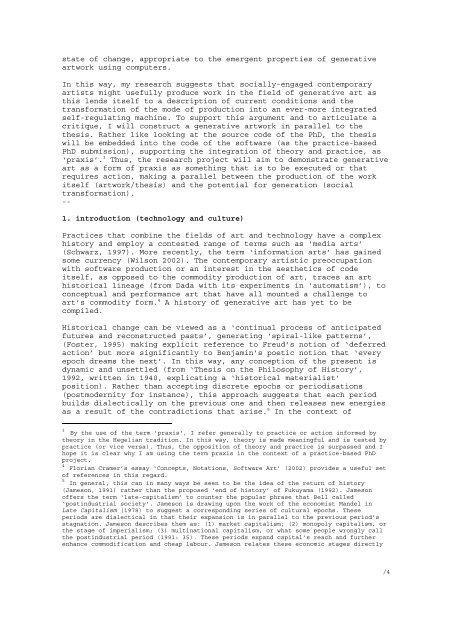anti-thesis: the dialectics of generative art (as praxis) - Geoff Cox
anti-thesis: the dialectics of generative art (as praxis) - Geoff Cox
anti-thesis: the dialectics of generative art (as praxis) - Geoff Cox
You also want an ePaper? Increase the reach of your titles
YUMPU automatically turns print PDFs into web optimized ePapers that Google loves.
state <strong>of</strong> change, appropriate to <strong>the</strong> emergent properties <strong>of</strong> <strong>generative</strong><br />
<strong>art</strong>work using computers.<br />
In this way, my research suggests that socially-engaged contemporary<br />
<strong>art</strong>ists might usefully produce work in <strong>the</strong> field <strong>of</strong> <strong>generative</strong> <strong>art</strong> <strong>as</strong><br />
this lends itself to a description <strong>of</strong> current conditions and <strong>the</strong><br />
transformation <strong>of</strong> <strong>the</strong> mode <strong>of</strong> production into an ever-more integrated<br />
self-regulating machine. To support this argument and to <strong>art</strong>iculate a<br />
critique, I will construct a <strong>generative</strong> <strong>art</strong>work in parallel to <strong>the</strong><br />
<strong><strong>the</strong>sis</strong>. Ra<strong>the</strong>r like looking at <strong>the</strong> source code <strong>of</strong> <strong>the</strong> PhD, <strong>the</strong> <strong><strong>the</strong>sis</strong><br />
will be embedded into <strong>the</strong> code <strong>of</strong> <strong>the</strong> s<strong>of</strong>tware (<strong>as</strong> <strong>the</strong> practice-b<strong>as</strong>ed<br />
PhD submission), supporting <strong>the</strong> integration <strong>of</strong> <strong>the</strong>ory and practice, <strong>as</strong><br />
‘<strong>praxis</strong>’. 3 Thus, <strong>the</strong> research project will aim to demonstrate <strong>generative</strong><br />
<strong>art</strong> <strong>as</strong> a form <strong>of</strong> <strong>praxis</strong> <strong>as</strong> something that is to be executed or that<br />
requires action, making a parallel between <strong>the</strong> production <strong>of</strong> <strong>the</strong> work<br />
itself (<strong>art</strong>work/<strong><strong>the</strong>sis</strong>) and <strong>the</strong> potential for generation (social<br />
transformation).<br />
--<br />
1. introduction (technology and culture)<br />
Practices that combine <strong>the</strong> fields <strong>of</strong> <strong>art</strong> and technology have a complex<br />
history and employ a contested range <strong>of</strong> terms such <strong>as</strong> ‘media <strong>art</strong>s’<br />
(Schwarz, 1997). More recently, <strong>the</strong> term ‘information <strong>art</strong>s’ h<strong>as</strong> gained<br />
some currency (Wilson 2002). The contemporary <strong>art</strong>istic preoccupation<br />
with s<strong>of</strong>tware production or an interest in <strong>the</strong> aes<strong>the</strong>tics <strong>of</strong> code<br />
itself, <strong>as</strong> opposed to <strong>the</strong> commodity production <strong>of</strong> <strong>art</strong>, traces an <strong>art</strong><br />
historical lineage (from Dada with its experiments in ‘automatism’), to<br />
conceptual and performance <strong>art</strong> that have all mounted a challenge to<br />
<strong>art</strong>’s commodity form. 4 A history <strong>of</strong> <strong>generative</strong> <strong>art</strong> h<strong>as</strong> yet to be<br />
compiled.<br />
Historical change can be viewed <strong>as</strong> a ‘continual process <strong>of</strong> <strong>anti</strong>cipated<br />
futures and reconstructed p<strong>as</strong>ts’, generating ‘spiral-like patterns’,<br />
(Foster, 1995) making explicit reference to Freud’s notion <strong>of</strong> ‘deferred<br />
action’ but more significantly to Benjamin’s poetic notion that ‘every<br />
epoch dreams <strong>the</strong> next’. In this way, any conception <strong>of</strong> <strong>the</strong> present is<br />
dynamic and unsettled (from ‘Thesis on <strong>the</strong> Philosophy <strong>of</strong> History’,<br />
1992, written in 1940, explicating a ‘historical materialist’<br />
position). Ra<strong>the</strong>r than accepting discrete epochs or periodisations<br />
(postmodernity for instance), this approach suggests that each period<br />
builds dialectically on <strong>the</strong> previous one and <strong>the</strong>n rele<strong>as</strong>es new energies<br />
<strong>as</strong> a result <strong>of</strong> <strong>the</strong> contradictions that arise. 5 In <strong>the</strong> context <strong>of</strong><br />
3<br />
By <strong>the</strong> use <strong>of</strong> <strong>the</strong> term '<strong>praxis</strong>', I refer generally to practice or action informed by<br />
<strong>the</strong>ory in <strong>the</strong> Hegelian tradition. In this way, <strong>the</strong>ory is made meaningful and is tested by<br />
practice (or vice versa). Thus, <strong>the</strong> opposition <strong>of</strong> <strong>the</strong>ory and practice is surp<strong>as</strong>sed and I<br />
hope it is clear why I am using <strong>the</strong> term <strong>praxis</strong> in <strong>the</strong> context <strong>of</strong> a practice-b<strong>as</strong>ed PhD<br />
project.<br />
4<br />
Florian Cramer’s essay ‘Concepts, Notations, S<strong>of</strong>tware Art’ (2002) provides a useful set<br />
<strong>of</strong> references in this regard.<br />
5<br />
In general, this can in many ways be seen to be <strong>the</strong> idea <strong>of</strong> <strong>the</strong> return <strong>of</strong> history<br />
(Jameson, 1991) ra<strong>the</strong>r than <strong>the</strong> proposed ‘end <strong>of</strong> history’ <strong>of</strong> Fukuyama (1992). Jameson<br />
<strong>of</strong>fers <strong>the</strong> term ‘late-capitalism’ to counter <strong>the</strong> popular phr<strong>as</strong>e that Bell called<br />
‘postindustrial society’. Jameson is drawing upon <strong>the</strong> work <strong>of</strong> <strong>the</strong> economist Mandel in<br />
Late Capitalism (1978) to suggest a corresponding series <strong>of</strong> cultural epochs. These<br />
periods are dialectical in that <strong>the</strong>ir expansion is in parallel to <strong>the</strong> previous period’s<br />
stagnation. Jameson describes <strong>the</strong>m <strong>as</strong>: (1) market capitalism; (2) monopoly capitalism, or<br />
<strong>the</strong> stage <strong>of</strong> imperialism; (3) multinational capitalism, or what some people wrongly call<br />
<strong>the</strong> postindustrial period (1991: 35). These periods expand capital’s reach and fur<strong>the</strong>r<br />
enhance commodification and cheap labour. Jameson relates <strong>the</strong>se economic stages directly<br />
/4


